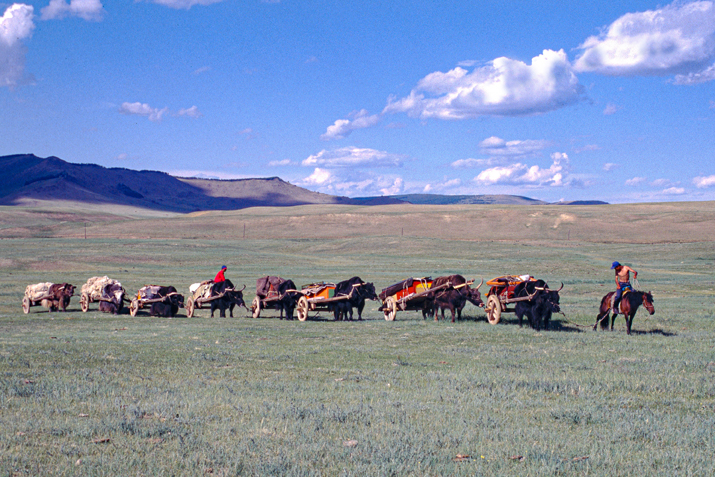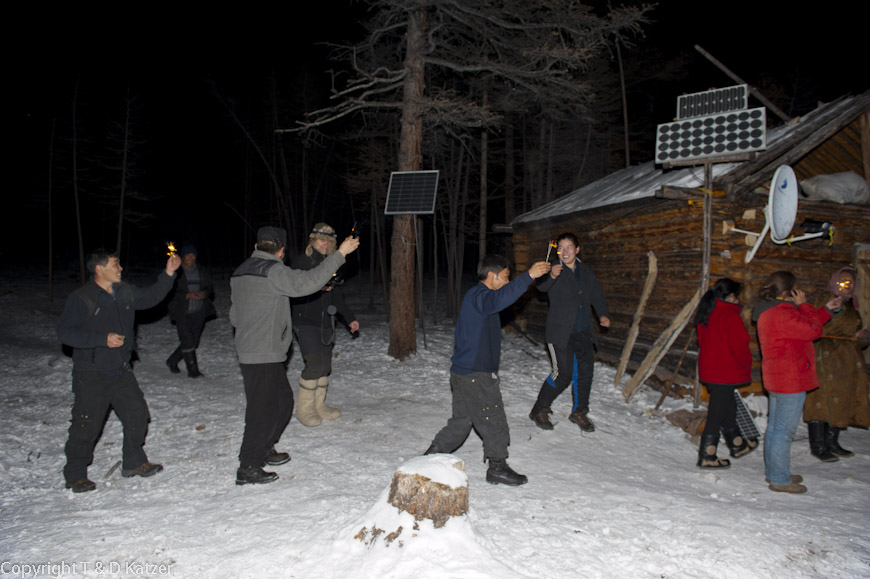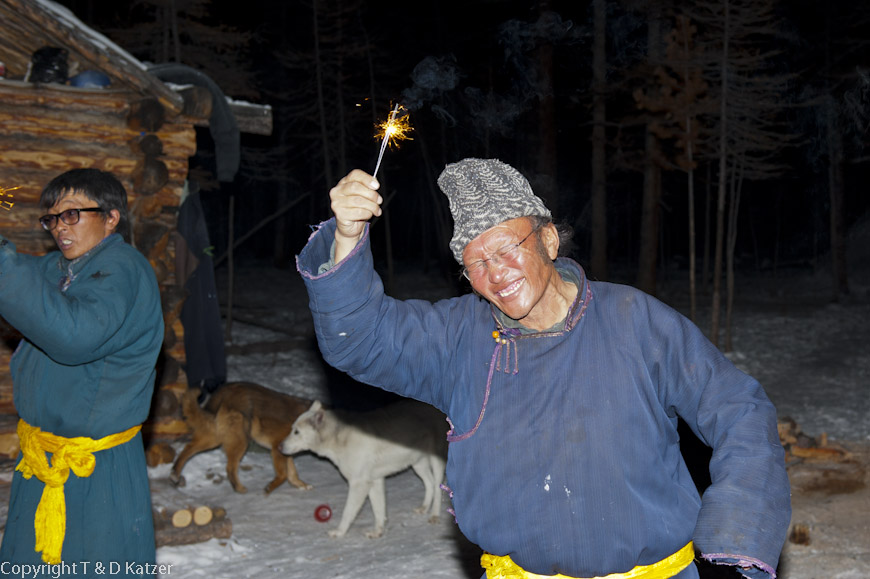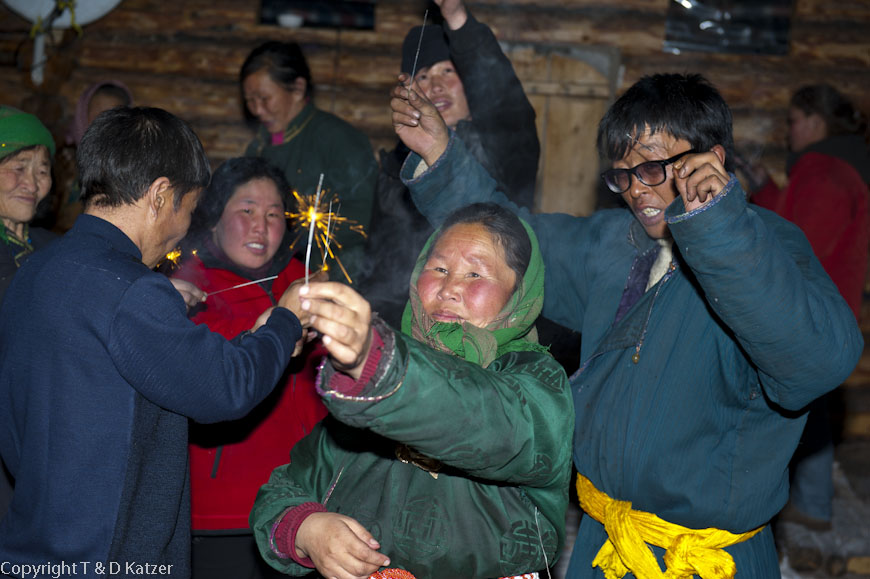
Into the New Year with a starry sky and sparklers
N 51°33'336'' E 099°15'341''
Day: 159
Sunrise:
09:28
Sunset:
17:21
Total kilometers:
1281
Soil condition:
Ice, snow
Temperature – Day (maximum):
minus 17°C
Temperature – day (minimum):
minus 25°C
Temperature – Night:
minus 30°C
Latitude:
51°33’336”
Longitude:
099°15’341”
Maximum height:
1981 m above sea level







The day brings us light snowfall. The shaman Saintsetseg, her daughter Monkoo and little Inbaayer come by to drink their coffee and eat cookies and sweets. Inbaayer also wants the black drink that everyone in the Tuwa camp is now raving about. “You’re still too young for that,” says Tanja and fills him a cup with herbal tea.
Tsaya and Ultsan invited us to their New Year’s Eve party yesterday. As there is still no movement at 19:00, I go to their log cabin to have a look. “Come in and eat with us,” says Tsaya happily. I enter the hut, which is full of people. “Where is Tanja? You have to get her,” says Tsaya. “I will,” I reply and walk back to our yurt. Shortly afterwards, we sit in the well-heated log cabin and eat potato salad with eggs, French sausage and mayonnaise. Tsaya also prepared buuz (dumplings filled with beef). “Oh my, this is delicious,” I praise the tasty food. “Brigitte brought some of the ingredients,” explains Tsaya. “Thank you Brigitte. This is also a treat for us, as we haven’t eaten potato salad for a long time,” I say to the French woman who arrived here yesterday with her Mongolian friend and a driver to spend the New Year with the Tuwa. Brigitte is Tsaya’s friend who helped her financially during her stay in hospital. She has a travel agency in Paris and would like to bring guests to the Tuwa in the future. “What matters to me is that these people here get something out of tourism. Most travel agencies that organize tours to the Tuwas are cashing in without the people here getting a single tugrik. I want to change that. My tourists are prepared and should also buy their carvings from the Tuwa here. That way they get something out of it. Apart from that, we will only take guides from the Tuwa. They bring their own horses or reindeer for round trips in the region. In this way, I try to prevent the Tuwa from being mercilessly exploited,” says the likeable woman.
As we have heard that even the local mayor charges tourists 25,000 tugrik (€14) per day as admission to the Tuwa and that the money mysteriously disappears, Brigitte’s idea is certainly commendable. The future will show whether it can be implemented.
I feast on the salad from the jar and another portion of potato salad when Tsaya asks me to take some more of the buuz. “I’ve prepared 100 of them. You absolutely have to eat more,” she says. “With the best will in the world, I can’t take any more. I’m full to the brim,’ I moan politely and defensively. Then a large bottle of beer is opened, a tankard filled and passed around. “It’s the custom to empty the glass,” I hear and try to comply. As soon as the contents of the large cup have disappeared into my stomach, it is refilled and handed to the next guest. He does as I do and gives it back to Tsaya. When the 2.5 liter bottle is empty, a new one is opened. “Where did you get all that beer?” asks Tanja. “Brigitte brought everything,” Tsaya replies. As we fill our stomachs, other members of the tribe keep coming in. They grab one of the many nicely arranged bags of sweets, briefly thank Brigitte and leave the room. “Have you brought a gift bag of sweets for every resident here?” I ask. “Yes,” Brigitte laughs. “You’re a very generous woman,” I say. “I’m happy to do that. If I can give, then I give,” she says modestly, coughing heavily as she has a bad cold.
“You have to eat cake. Look at that delicious cake. It has to go”, I hear the hostess’s words of encouragement. I am aware that just a single piece of it would have bad consequences. “I can’t take any more,” I moan, rubbing my stomach. “No shit. You’re a big man. Something will go in there,” she says. “Is it perhaps possible to eat the piece tomorrow morning? That would be really tasty. Then I could enjoy it much better,’ I say. “Sure, take it back to your yurt and enjoy it tomorrow with a cup of coffee,” I am thankfully given carte blanche to pack the treat. Although the Mongolian cakes are certainly not made with real cream and a lot of coloring has been added to mix in all the poisonous green pink and orange, they taste remarkably good. Or is it due to the months of abstinence from European baked goods?
“Let’s go to Gamba,” Tsaya urges her guests. It doesn’t take long and we set off to visit the shaman’s log cabin. Some of the Tuwa have also gathered there in the meantime. Another large bottle of beer is opened. “Wow, that’s a huge bottle,” I say to myself. “Five-liter bottles were the biggest I could get,” laughs Brigitte. “You’ve spent a small fortune on this party,” I say. “Oh, it wasn’t that bad.”
In Mongolia, it is customary to always drink from a single cup. This means that it is constantly being filled and passed on. This is a very good way to pass on various diseases from person to person. To refuse, however, would be a gross insult, which is why Tanja and I put our trunks into the cup to fill ourselves up with even more beer.
“That’s interesting. You only drink beer? I thought it was vodka that circulated at these parties?” I wonder. “As the last New Year’s Eve party turned into a terrible bender and many people ended up arguing or crying with each other, we decided not to drink alcohol this year,” explains Tsaya. “Remarkably disciplined and, above all, an exceptionally mature decision,” I praise. “Yes, so it will be a more peaceful festival,” says Tsaya. “I’m glad to hear that. But I have another question?” “Please, if I can answer it.” “Beer is also alcohol, isn’t it?” “Ha, ha, ha. Beer is not alcohol. It’s just beer. Vodka, with its 40%, that’s what we call alcohol,” we are told.
59-year-old Suren, who lives all alone in Tipi 1, now shyly enters the room. We hear that she didn’t want to come at all because she is unable to contribute anything to the celebration. After a few minutes, however, she leaves us again only to reappear. To everyone’s complete surprise, she pulls a bottle of vodka out of her Deel. She laughs and hands it to the shaman Gamba, who immediately blesses and opens it. Now, against all precedent, the vodka cup is spinning. Brigitte, who has brought so much beer with her, looks at the scene somewhat disapprovingly. It only takes a few minutes for the alcohol to run out. Then it continues with beer.
Hadaa, who only became a father this year, also takes a bottle of 40 percent out of his jacket. “We have to celebrate the birth of my daughter,” he calls out and hands the high-proof drink to Gamba, who blesses it, opens it and fills the first cup. The laughter quickly becomes more exuberant and young Galaa, who lives in Tipi 2 with his brother Huchee and sister Mama, has his feet pulled out from under him. Plopping down on his butt, he apologizes and staggers back up to tip another cup behind his gills.
Only 15 minutes after the blessing and opening of the second bottle, it is empty. As the atmosphere is now getting into full swing and the New Year celebrations are really picking up speed, the shaman decides to sacrifice a particularly fine bottle of the transparent liquor from a small, locked wooden chest. The result is a welcome shout. The women, Darimaa, old Suren, the wife of the shaman Purvee, Buyantogtoh, the shaman Saintsetseg and her daughter Monkoo are in no way inferior to the men and enjoy the vodka just as much. Meanwhile, Tanja keeps giving cigarettes to the revelers. “Bairlalaa, Bairlalaa”, they say thank you
Meanwhile, a few wrinkles form on Tsaya’s forehead. But wanting to slow down the festivities now by depriving it of alcohol is impossible. The small bowl filled with vodka also passes Tanja and me again and again. “Drink up. Everything!” shout our hosts. I obey and let the liquid slide down my throat. My stomach is growling louder and louder now. Potato salad with mayonnaise, sausage from France, eggs, salad from the jar and some of the buuz have combined with the beer and alcohol to form a dangerous mixture. “Drink up! Drink it all in!” Gamba cheers me on repeatedly.
At midnight, Tsaya asks us to follow her. Some of the celebrants stand up. We walk over the crunching snow to Ultsan and Tsaya’s log cabin. A bottle of champagne, also introduced to the camp by Brigitte, is tapped there. As there are not enough cups, I drink my delicious portion from a ladle. “And now let’s go outside. The sparklers are waiting!” shouts Tsaya. Tanja bought extra sparklers for the occasion. She hands two sparklers to each of the 19 people present. Tso, who like the other Tuwa has never seen a sparkler before, simply takes a bite. “No, don’t eat them! These things are for lighting on fire!” shouts Tsaya.
As the first sparklers spray their twinkling stars into the night sky of the taiga, something happens that is difficult to describe in words. People begin to sing and laugh. They wave the sparklers through the air. There is dancing. The faces are enraptured. “Happy New Year! Happy New Year! Happy New Year!” I shout at the top of my voice, filming the merry community. “Happy New Year! Happy New Year! Happy New Year!”, some of them repeat my words. “Come together. Tanja will take a group photo of us!” Tsaya asks the festival community to gather in front of the shaman’s house. Whenever the lightning flashes through the night, people exclaim with joy as if they were the most beautiful fireworks. Flash, flash, flash, Tanja illuminates people in glaring light more often than necessary. “Happy New Year! Happy New Year! Happy New Year! Uuuhhhuuu! Hurrrrraaaa!” I shout again and again. “Ha, ha, ha, hi, hi, hi! Uuuhhhuuuu! Hurrrraaaa!” it sounds. Meanwhile, the Tuwa try to light the sparklers again and are sad when the star-spitting sticks no longer work. Tanja is delighted to distribute the rest of the five packs among the people.
After the exuberant dance of joy, we all return to the shaman’s hut. The next bottle of vodka materializes
out of nowhere. The drinking party continues and becomes even merrier. After the first people drop out and it can’t be long before they are under the table, we say goodbye. There is some resistance, which we parry with open laughter and the words “Bi mongoloor moo oilgidsch” (“I don’t understand Mongolian very well”).
After lying on our Wandan with our eyes wide open, Tanja says: “It was the best New Year’s Eve party of my life.” “Yes, it was indeed exceptionally beautiful,” I reply. “Did you see the happy faces and their shining eyes when they held up the sparklers?” asks Tanja. “I did.” “How wonderful it is to be able to give people such joy with such a small thing,” I hear as my eyes fall shut from tiredness.
We look forward to your comments!

